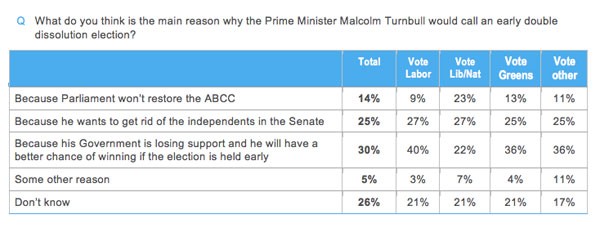Prime Minister Malcolm Turnbull’s commitment to call a double dissolution election if the Australian Building and Construction Commission bill isn’t passed has significant support from voters — but he would struggle to win an election at the moment, according to today’s Essential Report.
Just 23% of voters oppose Turnbull calling a double dissolution election, while 44% support it, with even Labor voters backing it 37%-34%. Liberal voters back it 65%-11%, while 33% of voters say they don’t know.
However, the Coalition primary vote is currently on 43%, unchanged since last week, while Labor is also unchanged on 38%. The Greens, however, are down another point to 9%, the first time their vote has dipped into single figures since June, following strong criticism from Labor about the party’s deal with the Coalition to allow Senate voting reform changes through the Senate. The two-party preferred outcome remains at 50%-50%.
Voters are also sceptical, if not outright cynical about Turnbull’s reasons for a double dissolution election. Only 14% of voters believe Turnbull’s main reason for a double dissolution is “because Parliament won’t restore the ABCC”; 30% agree that “his Government is losing support and he will have a better chance of winning if the election is held early” while another 25% believe the main reason is that “he wants to get rid of the independents in the Senate”. Even Liberal voters, while more likely to believe it’s because Turnbull genuinely wants to restore the ABCC (23%), think it’s more because he wants to eliminate independents from the Senate (27%) and even because he wants to go to an election early to avoid losing more support (22%).

The government also faces a difficult challenge to convince voters of the need for company tax cuts, one of the few remaining options on the tax reform table. Sixteen per cent of voters say company tax cuts are more important than income tax cuts, while 62% say income tax cuts are more important; voters split almost exactly the same, 61% to 19%, on whether income tax cuts or company tax cuts would be better for the economy. And while Coalition voters prefer company tax cuts slightly more, even they are strongly against company tax cuts, 58%-27%.
Party attributes have undergone some interesting changes since November. The extended bout of dithering from the government over tax reform has left voters confused: 46% of voters believe the Liberal Party has “a vision for the future” compared to 54% in November; “clear about what they stand for” has fallen from 46% to 39%; “has a good team of leaders” has fallen from 48% (the highest recorded level for the Liberals since the question was first asked in 2009) to 41%. Meanwhile, the perception the Liberals are “divided” has increased from 56% to 61%.
Labor, however, has undergone its own shift. Perceptions that Labor is “moderate” have fallen from 56% to 47% while perceptions it is “extreme” have risen five points to 35%; perceptions that Labor “understands the problems facing Australia” and “looks after the interests of working people” are both down five points.
Head to head, the results are mixed: the Liberals have a huge lead on “too close to the big corporate and financial interests”, 62% to 35%, and trails 19 points on “looks after the interests of working people” but leads by 11 points on “has a good team of leaders” and is still more “clear about what they stand for”, than Labor, but only by four points.








“perceptions that Labor “understands the problems facing Australia” and “looks after the interests of working people” are both down five points.”
Reminds me of Churchill’s “The best argument against democracy is a five minute conversation with the average voter”
Or Mencken’s “Democracy is a pathetic belief in the collective wisdom of individual ignorance.”
Oh dear!
As Turnbull won’t be acting on Crikey’s advice or wishes, it’s reasonable to expect that [in common with all sensible / competent Prime Ministers] he’ll campaign on issues needed to get him across the line and Legislate for what is best for most Australian Citizens.